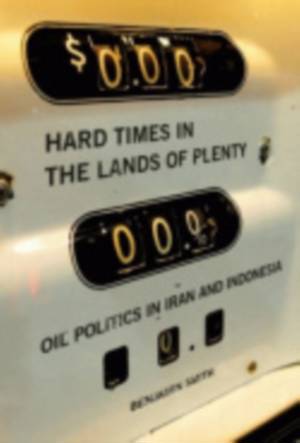
- Retrait gratuit dans votre magasin Club
- 7.000.000 titres dans notre catalogue
- Payer en toute sécurité
- Toujours un magasin près de chez vous
- Retrait gratuit dans votre magasin Club
- 7.000.0000 titres dans notre catalogue
- Payer en toute sécurité
- Toujours un magasin près de chez vous
Hard Times in the Lands of Plenty
Oil Politics in Iran and Indonesia
Benjamin SmithDescription
That natural resources can be a curse as well as a blessing is almost a truism in political analysis. In many late-developing countries, the "resource curse" theory predicts, the exploitation of valuable resources will not result in stable, prosperous states but rather in their opposite. Petroleum deposits, for example, may generate so much income that rulers will have little need to establish efficient, tax-extracting bureaucracies, leading to shallow, poorly functioning administrations that remain at the mercy of the world market for oil. Alternatively, resources may be geographically concentrated, thereby intensifying regional, ethnic, or other divisive tensions.
In Hard Times in the Land of Plenty, Benjamin Smith deciphers the paradox of the resource curse and questions its inevitability through an innovative comparison of the experiences of Iran and Indonesia. These two populous, oil-rich countries saw profoundly different changes in their fortunes in the period 1960-1980. Focusing on the roles of state actors and organized opposition in using oil revenues, Smith finds that the effects of oil wealth on politics and on regime durability vary according to the circumstances under which oil exports became a major part of a country's economy. The presence of natural resources is, he argues, a political opportunity rather than simply a structural variable. Drawing on extensive primary research in Iran and Indonesia and quantitative research on nineteen other oil-rich developing countries, Smith challenges us to reconsider resource wealth in late-developing countries, not as a simple curse or blessing, but instead as a tremendously flexible source of both political resources and potential complications.
Spécifications
Parties prenantes
- Auteur(s) :
- Editeur:
Contenu
- Nombre de pages :
- 256
- Langue:
- Anglais
Caractéristiques
- EAN:
- 9780801472770
- Date de parution :
- 02-08-07
- Format:
- Livre broché
- Format numérique:
- Trade paperback (VS)
- Dimensions :
- 168 mm x 232 mm
- Poids :
- 367 g







